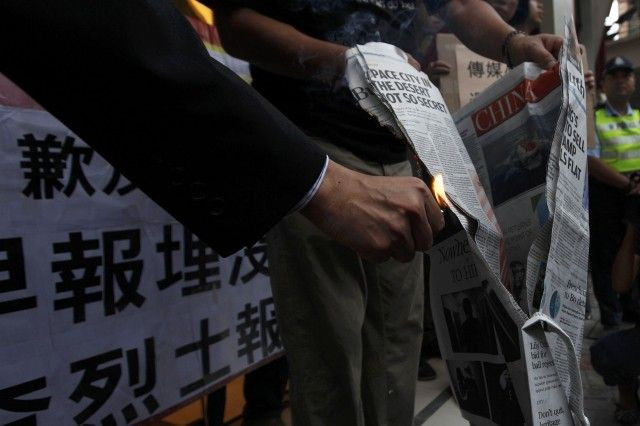China'a Power Transition Sparks Fears Of A Media Crackdown

The sudden removal of senior staff members at two Chinese newspapers known for irking government censors has sparked concerns of a media crackdown in the runup to China's decadal transition of power this October.
The editor-in-chief of Guangzhou's New Express, Lu Fumin, has been shifted sideways to head parent paper the Yangcheng Evening News, while the publisher of Shanghai's Oriental Morning Post, Lu Yan, has been reassigned to another division of the company and deputy editor Sun Jian has been suspended.
The New Express said Lu Fumin's transfer was expected and at his request, while the Oriental Morning Post was unavailable for comment regarding its staff changes.
I think these can probably be read as the surfacing of tensions playing out on a daily basis across the country's media, David Bandurski, an editor at Hong Kong University's China Media Project, told the Guardian. These are probably more egregious examples of the tightening of everyday control ahead of the 18th Party Congress, which will see the transition to China's new generation of leaders .
Since Lu Fumin's transfer, the editorial page has disappeared from the Express and its national and international coverage has been slimmed down, while its entertainment, sports and local news coverage has been expanded.
[The central government] has not decided on the [future] political route yet so it is now super-sensitive to any challenge from the public, Yang Haipeng, a former Post reporter, told the Telegraph. Now is really a chaotic time, it's hard to tell what is OK and what is not. Anything could upset their sensitive nerves.
The Express had previously published an article examining the background of Chinese officials, including President Hu Jintao's heir-apparent Xi Jinping, expected to rise to the nine-member Politburo Standing Committee -- the ruling Communist Party's highest political organ.
Perhaps some high-ranking officials want to prevent China's domestic media from writing anything too early that touches upon the selection of candidates [to the committee], and that this is why the axe has fallen, Wen Yunchao, a veteran journalist formerly working in China's state-run media, told Radio Free Asia.
Among the other officials mentioned was Wang Yang, the party chief in Guangdong, the province where the Express is based.
Everyone knows that Guangdong leader Wang Yang is looking to move a step higher, and press freedom has to be restricted in Guangdong so as to protect his plans and aspirations, Zhu Jiango, a Shenzhen-based political commentator, told RFA.
The Post had previously published reports on China's embarrassing 2008 melamine-tainted milk scandal and the 2011 high speed rail crash, as well as critical pieces on the massive Three Gorges Dam project.
They [the Post] have always been pretty liberal, and quite daring in some of the reporting they do, Feng Jun, a former Post reporter, told RFA.
Many Chinese media analysts believe that restrictions on reporters will ramp up as the 18th Party Congress approaches, with pressure to cut back on political coverage and to keep reporters from leaving their local regions.
Yang, the former Post reporter, told the Telegraph that he believed media restrictions would relax after the power transition was complete.
Maybe in six months, things will change again, back to [how they were] before, he said. But we can't be too optimistic about this, because we in the media are like dancing girls: We dance quicker or slower as told. Now is a crazy time, before the 18th Congress.
--
© Copyright IBTimes 2024. All rights reserved.





















